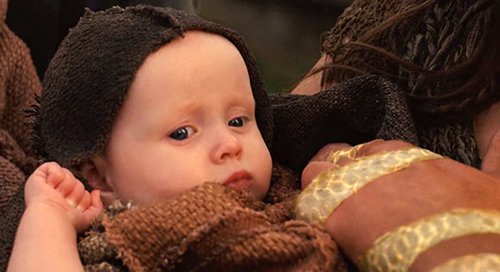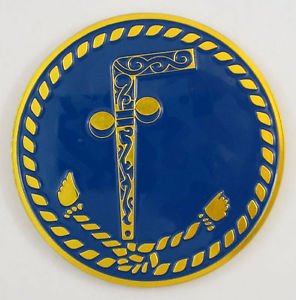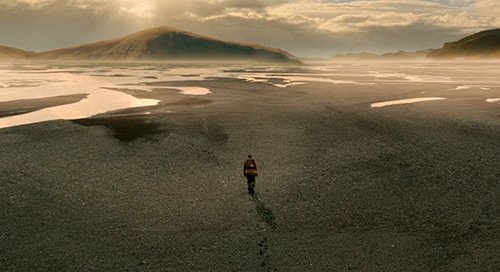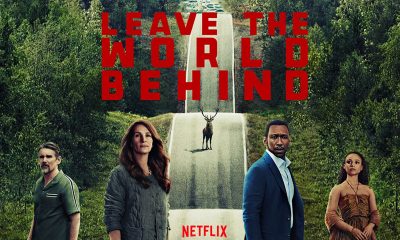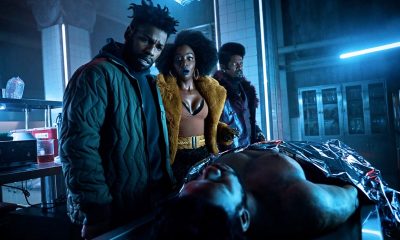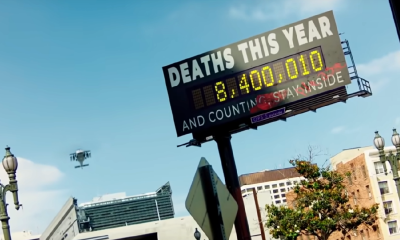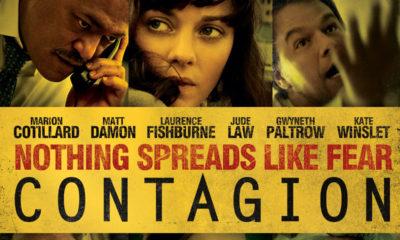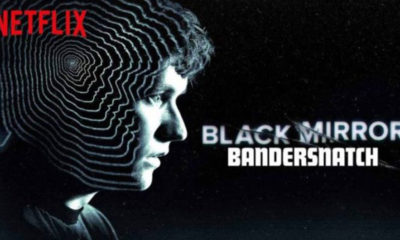Movies and TV
“Noah”: A Biblical Tale Rewritten to Push an Agenda
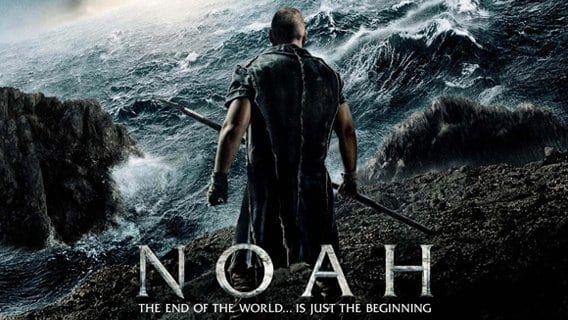
Since its release in early 2014, the big-budget movie “Noah” has caused controversy for not being biblically accurate. While that is certainly the case, the movie does more than take liberties with the Bible: “Noah” pushes messages that have nothing to do with the Bible. These messages are actually political and come directly from the world elite. The primary message? Humanity needs to be cleansed … again.
Throughout his movie-making career, Darren Aronofsky has created quite a few controversial movies with a powerful underlying message (see my article on the movie Black Swan here). None of his work can be considered “idiotic” and, despite what critics say, Noah is not an idiotic movie either. Sure, it contains giant stone monsters, primitive bazookas and Noah killing a bunch of poor souls, but the movie is smart enough to effectively communicate several of its core messages, twisting one of the oldest tales in the world to push an agenda that is very 2014.
While many viewers were upset about the many liberties taken in this retelling of Noah’s Ark – a tale that exists in Jewish, Christian, and Muslim literature – the messages added to the story should be even more upsetting. Noah re-formats this ancient tale to describe the basic premise of a new religion, one that has been pushed on the masses for years. Based on the elite’s long-term Agenda of drastically depopulating the Earth, this new religion is about radical environmentalism, the devaluation (and even hatred) of human life, and the re-alignment of morality towards a new axis.
Through its odd narrative, the movie turns the tale of Noah’s Ark into an absurd and disturbing adventure that leads viewers wondering: Why is God so evil? And why is Noah such a jerk? When Noah’s wife asks him if “the Creator” (that’s the name for God in the movie) will help them survive, Noah’s answer is almost comedic, as if he was describing a super-villain:
“He’s going to destroy the world”.
While the Bible explains that the Great Flood was caused by a mysterious race of Giants corrupting and “infecting” humanity, the movie does not go that route. Instead, it repeatedly tells us that humans are evil and deserve to die.
Formatted for Today
Before getting into the actual story, I need to point out a detail that is seemingly trivial, but that tells loads about the movie’s true goal: Why is everybody dressed as if they got their clothes from the world’s first Zara store?
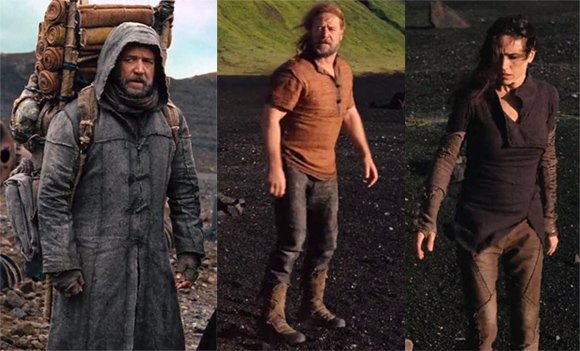
Even if he lives in a barren, God-forsaken land (with no sewing equipment in sight) Noah always finds a way to look quite stylish. Whether he’s wearing a nice coat with fancy buttons, backpacks with all kinds of straps and pockets, perfectly fitted sexy polos or pants that strangely look like jeans, Noah is not your typical robe-wearing Biblical figure. He actually looks like a hipster going to Starbucks. Even his wife looks quite modern with her nicely designed, form-flattering shirt and cool pants, complete with stylish patches.
These made-for-a-2014-audience outfits basically tell us that Noah is not about the Bible – it is about today. It is a message to humanity right now, directly from the elite.
While the premise of Noah is based on the Biblical story from the book of Genesis, the creators invented characters, subplots, symbols, images, and messages to completely reshape the tale, giving it a twisted, disturbing and wholly “unspiritual” meaning. Even if one watches the movie fully expecting a “creative retelling” of Noah’s Ark, it is difficult to not be disturbed by the bloody, violent, near-psychopathic tangent taken by the main character. I mean, Noah actually kills a bunch of people in the movie! How can that remotely make sense in the divine context of the story? Well, it actually does make sense … when we understand that the movie is meant to sell a new religion dictated by the world elite composed of values it wants the masses to adopt. One of these values is that human life is cancer on Earth that needs to be eradicated. In other words, they want humans to sincerely believe they are evil to justify depopulation. Of course, as the movie tells us, most humans do die … EXCEPT those of the chosen bloodline. And that is what the elite wants us to think. We must all die to save the Earth … except them.
Noah is strikingly similar to another movie analyzed on Vigilant Citizen: 2012. As I noted in this article, 2012 is a disaster movie that is essentially about the rich and powerful people (the elite) surviving a gigantic flood while everyone else dies. The movie was full of references to the tale of Noah’s Ark and even shows helicopters transporting various animals to giant ships. The movie posters of Noah and 2012 are also strikingly similar.
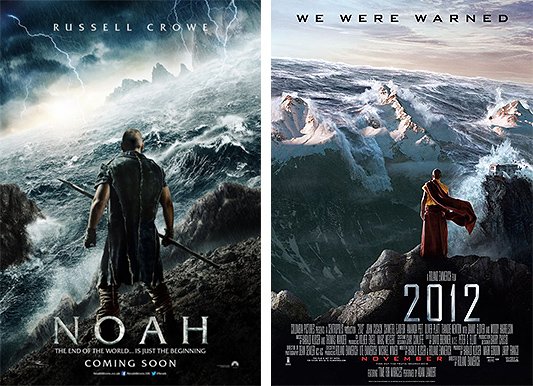
Noah and 2012 tell the same story but in different time periods. The outcome is the same: The masses die while a “chosen few” survive. It seems that the occult elite enjoys the story of Noah’s Ark very much.
Noah is, therefore, a reconstitution of a biblical story tailor-made to fit the Agenda continually being pushed by the elite … and as usual, the Agenda is rather upsetting. It promotes the idea of massively depopulating the Earth and sells it as an ecological mission. Extreme environmentalism is the new religion being sold to the masses through fear.
This religion is not only promoted in works of fiction, it is found in real life monuments. The Georgia Guidestones is a gigantic collection of stones (dubbed America’s Stonehenge) on which are laid out ten NEW commandments.
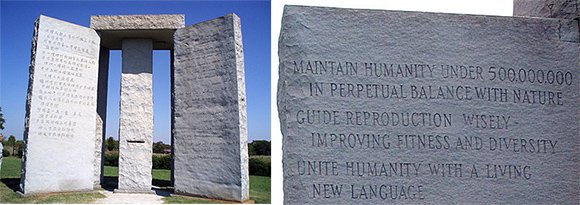
The first “commandment” of the Guidestones: “Maintain humanity under 500,000,000 in perpetual balance with nature”. From the 7 billion people on Earth today, 93% of humanity would need to die to reach 500 million.
In the article I wrote about the Guidestones, I explain that it was built by members of occult secret societies. The last commandment of the stones sums up the main message of the movie Noah:
“Be not a cancer on the Earth – Leave room for nature – Leave room for nature”.
In Noah, it is explained that humanity needs to be extinct because it is disrespectful to nature. That is not what is said in the Bible, but that is the message this movie (and the elite) wants you to absorb.
Vilifying Humanity to Justify Depopulation
Right from the first scenes of the movie, Noah (dressed in his little Zara outfit) talks to his kids about hardcore environmental concepts that were probably the last thing on people’s minds in these very ancient times. When Noah’s son sees a pretty flower and tries to pick it, Noah jumps in to stop the senseless destruction.

Noah tells to his son “You see how the flowers are attached to the ground? It’s where they should be. They have a purpose.”
That little scene announces Noah’s rather extreme brand of environmentalism. A little later, Noah sees “men” (a pejorative term in the movie) hunting an animal in order to eat it. Noah runs to the rescue of the animal and stabs one of the men in the leg. He then calls his act of violence “justice”. Yes, Noah is apparently an extreme vegan who stabs people who eat meat.
When Noah’s son asks him why these evil men believe that eating meat gives them strength, he replies:
“They forget strength comes from the Creator”.
This, of course, is not found in the Bible. It is part of the movie’s message that basically says “Animals > Humans”. Throughout the movie, Noah refers to animals as “the innocent” while humans are perceived as scum who deserve to die. Noah, however, seems to forget that many animals are carnivorous beasts who spend most of their time hunting and devouring other animals. Some might say: That is what God intended.
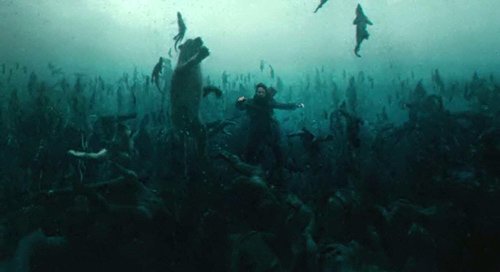
Noah has a dream where all humans die drowning, but animals swim towards the surface. He really hates humans.
At one point Noah tells his children:
– We’ve been chosen to save the innocent. The animals.
– Why are they innocent?
– Because they still live as they did in the Garden.
Throughout the movie, Noah, the “hero of the movie” displays absolute hatred for humanity and avoids it at all costs. Every time he sees “men” or man-created structures, he automatically becomes worried.
Twisting the Biblical Bit About the Giants
To further its anti-humanity message, the movie significantly twists and contorts Biblical passages about a mysterious race called the Giants found in the book of Genesis. In the Bible, the Giants are offsprings of a group of 200 “Sons of God” who descended to Earth to mix with humans. They are said to have taught humans advanced skills such as metallurgy, metal working, cosmetics, sorcery, astrology, astronomy, and meteorology. Because the Giants disobeyed God, they were also called the Fallen Angels. (Interesting note: Lucifer is also referred to as a Fallen Angel and is said to have brought forbidden knowledge to men).
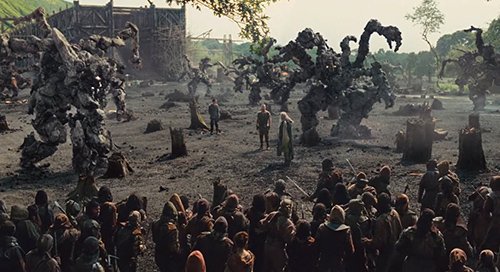
Noah is aided by a bunch of big monsters made of rocks called the Giants. Many viewers were put off by this Lord of the Ring-style fantasy CGI addition.
In the book of Genesis, it is said that the Giants (also called the Nephilim) were a hybrid race of sons of God and human females.
When human beings began to increase in number on the earth and daughters were born to them, the sons of God saw that the daughters of humans were beautiful, and they married any of them they chose. (…) The Nephilim were on the earth in those days—and also afterward—when the sons of God went to the daughters of humans and had children by them.”
– Genesis 6:1–4
The Nephilim are described in the Bible (and other apocryphal texts) as a race of giants who lived among humans. They ultimately became a destructive presence and were said to have consumed “all acquisitions of men”. In order to rid these beings from Earth (along with the humans who mixed with them) God caused the Great Flood.
The Bible, therefore, describes the Giants as the main cause of humanity’s corruption. The movie, however, portrays the exact opposite. In Noah, the Giants are described as gentle teachers who came to aid humans, but ultimately became victims of humanity’s cruelty. Later, Giants actually help Noah build the Ark! In short, the movie inverted important parts of the Bible to say that humanity is solely responsible for its demise because it had evolved into a state that was beyond repair. The movie also makes it clear that its anti-humanity message is still applicable today.
In one significant part of the movie, Noah tells his family the “first story he ever heard”. It begins with the first line of the Bible “In the beginning, there was light” but then devolves into a grim speech about the evils of humanity.
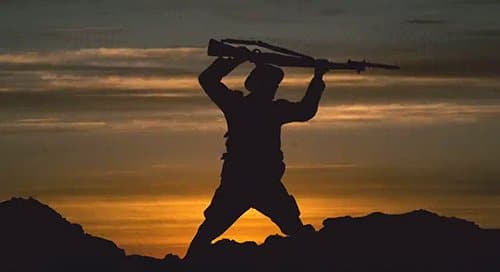
Noah’s story about humanity is intercut with images of modern soldiers killing men. This is a rather clear way of telling us that Noah’s desire to rid Earth of humanity still applies today.
The movie, therefore, pushes the viewers to conclude that humanity is, once again, beyond hope. Massive depopulation is therefore not a horrible catastrophe but a necessary “cleansing process”. Noah himself says:
“Fire consumes all. Water cleanses. It separates the foul from the pure. The wicked from the innocent. And that which sinks from that which rises. He destroys all, but only to start again.”
This line is not from the Bible. It comes from the minds of psychopaths who want to depopulate the Earth and describing it as a “cleansing process”. Depopulation is good. Death equals cleansing.
In the end, Noah realizes that not all humanity needs to die after the flood: His family survives. And there lies another important message of the movie: Depopulation does not apply to all humanity. It only applies to those who are not part of the “chosen” bloodline. This is the kind of the message the occult elite wants us to assimilate because they believe THEY are the chosen bloodline.
It’s All About the Bloodline
Spoiler alert: Noah and his family survive the Great Flood. But no one else does. Right from the beginning of the movie, we are told that the survival of humanity must go through a specific bloodline. Viewers immediately learn that Noah descends from Seth while the bad guys descend from Cain – a fact that is apparently VERY important.
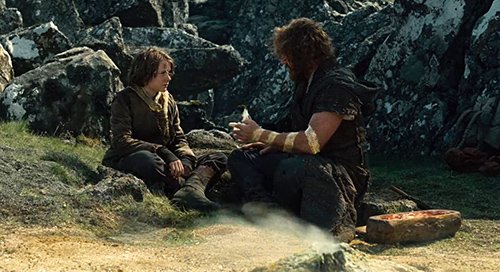
In one of the first scenes of the movie, we see a young Noah receiving his birthright by his father. Around Noah’s father’s arm is the skin of the snake of the Garden of Eden which represents the continuation of the line of Adam.
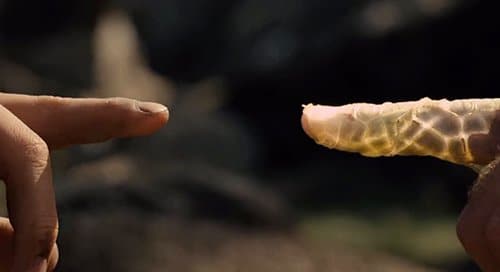
Noah then goes to touch the finger of his father, which is illuminated by the snakeskin. This “magical” scene represents the passing down of the “chosen” bloodline from one generation to another.
Of course, none of this is mentioned in the Bible. It is one of the many fabrications added to flesh out the story and to give it a specific angle: God favors a specific bloodline.
Later in the movie, Noah’s father, Methuselah, is depicted as a reclusive but supernatural being who magically guides Noah through the Creator’s plan. While Methuselah was never mentioned in the Bible as having a role in the construction of the Ark, this addition strengthens the idea of the bloodline.
There are other strange “non-Biblical” additions to the movie that ultimately makes us think that Noah is not a “man of God”, but a jerk who only wants to see his bloodline survive. For instance: Noah actually kills a bunch of people.
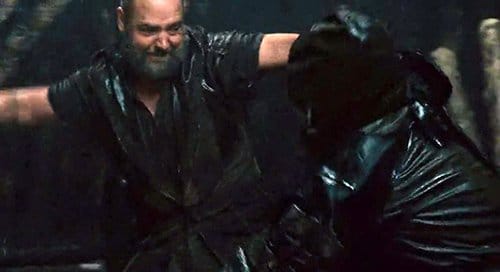
When humans try to get to the Ark, Noah gets mad and starts slaying a bunch of people, cutting their heads off and spearing them.
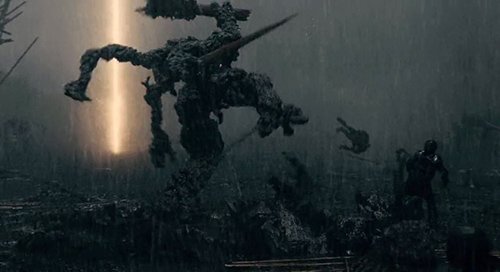
We even see the Giants kicking and stomping humans by the dozens as if they were cockroaches. And these are “good guys”.
In another gut-wrenching (and completely invented) scene, Noah purposely allows his son’s girlfriend to be trampled to death by hundreds of people.
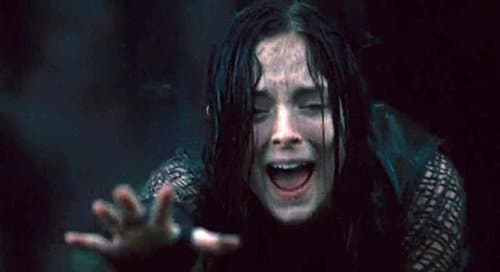
Noah could have saved that girl. Although Ham assured his father that this girl was “good and innocent”, he lets her die a horrible death.
How can a man, that is supposedly chosen by the Creator, allow the death of an innocent girl? Why was this added to the movie? Because it is continuously communicating a message: Whether she was good or not is irrelevant. The girl was not part of the bloodline. Therefore, she must die. It is not about being a good person. It is about who you descend from.
After the flood, Noah turns into a disturbed, depressive, psychopath. When he learns that his daughter-in-law is pregnant, he is convinced that he must kill the little girl to make sure that humanity does not reproduce.

In yet another scene that was never in Bible, Noah holds a knife to his granddaughter’s face in order to kill her.
Noah, however, realizes something incredible: He does not feel like stabbing his own granddaughter in the face. Although he first believes that he had let down the Creator by not killing the girl, he ultimately learns that he did the right thing by “showing mercy”. But what about the countless humans he killed? Wasn’t there any mercy for them? No. Because they were not part of the bloodline. The Creator allowed Noah to murder people when they were not “chosen”. Incidentally, that is what the occult elite believes.
The movie depicts Noah’s “divine” quest as a cruel and violent process carried out by a man who is steadily turning into a psychopath. While stranded on the Ark, his own family begins to resent him as he obsesses over the fact that everybody needs to die. While he is merely following the Creator’s orders, he appears to be animated by a deep-seeded hate of humanity, which leaves viewers with an “unholy” feeling. There is, however, a character that counterbalances Noah’s “do it my way or else” doctrine: Tubal-Cain.
Tubal-Cain: The Other Path
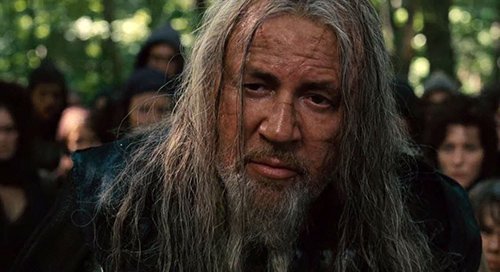
Tubal-Cain is the “bad guy” of the movie and descends from Cain (unlike Noah who descends from Seth).
Tubal-Cain is the “leader of humans”, and, therefore, Noah’s mortal enemy. While Tubal-Cain is the “bad guy”, he is ironically the character who says the most thoughtful and sensible lines, which causes viewers to somewhat identify with him. Contrarily to Noah, he is not ashamed to be human and is proud of humanity’s accomplishments. Furthermore, he feels somewhat forsaken by the Creator who left his kind to roam a desolate land. He seeks to emancipate himself from the Creator’s rule through his own means. In this sense, he is a representative of a Gnostic point of view that perceives the Creator a demiurge – a lower god who imprisoned mankind in a material world. This is why God is called “the Creator” in the movie. It refers to the Gnostic concept of demiurge, the near-malevolent creator of the material world.
Tubal-Cain is briefly mentioned in the Bible as a “forger of all instruments of bronze and iron” and an “instructor of every artificer in brass and iron”. However, he is never mentioned in the story of the Great Flood and has no link with Noah. So why did the makers of the movie choose this obscure Biblical character to become Noah’s arch-nemesis? Because, while Tubal-Cain is an obscure figure in the Bible, he is an extremely important figure in the most widespread Gnostic Mystery School on Earth: Freemasonry.
Not unlike Hiram Abiff (a leading figure in Masonic lore and ritual), Tubal-Cain is an obscure Biblical figure who takes a great importance in esoteric teachings. As a proficient maker of weapons, he represents humanity’s potential to build its own power – without the Creator. Various Masonic sources describe the esoteric significance of Tubal-Cain.
“He was the inventor of edge-tools, and introduced many arts into society which tended towards its improvement and civilization. Tubal Cain is the Vulcan of the Pagans, and is thought to have been closely connected with ancient Freemasonry. Faber says that “all the most remarkable ancient buildings of Greece, Egypt, and Asia Minor, were ascribed to Cabirean or Cyclopean Masons,” the descendants of Vulcan, Dhu Balcan, the god Balcan, or Tubal Cain. Oliver says, “In after times Tubal Cain, under the name of Vulcan and his Cyclops, figured as workers in metals and inventors of the mysteries; and hence it is probable that he was the hierophant of a similar institution in his day, copied from the previous system of Seth, and applied to the improvement of schemes more adapted to the physical pursuits of the race to which he belonged.
For these reasons Tubal Cain has been consecrated among Masons of the present day as an ancient brother. His introduction of the arts of civilization having given the first value to property. Tubal Cain has been considered among Masons as a symbol of worldly possessions.
– Albert Mackey, “A Lexicon of Freemasonry”
In Manly P. Hall’s “The Lost Keys of Freemasonry”, Tubal-Cain is described as the “forefather” of Freemasons.
“The day has come when Fellow Craftsmen must know and apply their knowledge. The lost key to their grade is the mastery of emotion, which places the energy of the universe at their disposal. Man can only expect to be entrusted with great power by proving his ability to use it constructively and selflessly. When the Mason learns that the key to the warrior on the block is the proper application of the dynamo of living power, he has learned the mystery of his Craft. The seething energies of Lucifer are in his hands and before he may step onward and upward, he must prove his ability to properly apply energy. He must follow in the footsteps of his forefather, Tubal-Cain, who with the mighty strength of the war god hammered his sword into a plowshare.
– Manly P. Hall, “The Lost Keys of Freemasonry”
Mystery Schools love Biblical characters who did not rely on God to gain knowledge and power. Tubal-Cain is a prime example. In Noah, Tubal-Cain attempts to communicate with the Creator – not as a servant, like Noah, but as an equal.
“I am a man. Made in your image. Why will you not converse with me? I give life. I take life away. As you do! I am like you! Am I not? Speak to me!”
Although Tubal-Cain realizes that humanity is about to be wiped away, he finds an unexpected person to carry on his legacy: Noah’s own son, Ham.
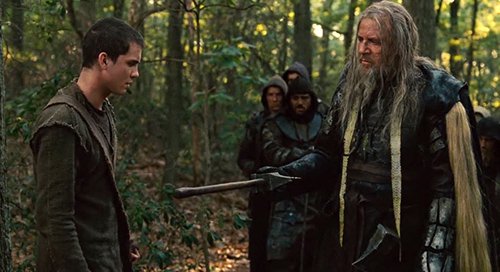
Tubal-Cain presents a sword to Ham. He is giving him the opportunity to “become a man” by giving him the power to take life.
Throughout Noah’s quest, Ham feels ignored, rejected and infantilized. He feels that he cannot become a man without being with a woman – a right that is denied by his father. Tired of being punished and humiliated, Ham leaves the Ark and mixes with the “nasty” humans. There, he finds a “good girl” he wants to marry. However, Noah leaves her to die and drags Ham back to the Ark by force.
When Ham meets Tubal-Cain, he finds the kind of father figure he has been looking for. Instead of a life of blind servitude, Tubal-Cain offered Ham the means to be a “real” man. During the flood, Tubal-Cain found a way to sneak inside the Ark and, while hidden with the animals, he “initiated” Ham to his philosophy.
“Your father filled this ship with beasts while children drown. He belittles you by telling you you must serve them. No. They serve us. That is the greatness of men. When the Creator finished making the sky, the ground, the sea and these beasts, he wasn’t satisfied. He needed something greater. Something to take dominion over it and subdue it. So he made us in his image. Us. This is your world Ham, seize it”.
While these words were said by the “bad guy”, he was nearly quoting actual Biblical verses. This only adds to the movie’s general confusion and mixed messages.
“And God said, Let us make man in our image, after our likeness: and let them have dominion over the fish of the sea, and over the fowl of the air, and over the cattle, and over all the earth, and over every creeping thing that creepeth upon the earth.”
– Genesis 1:26, KJV
Tubal-Cain then ultimately urges Ham to kill his father:
“A man isn’t ruled by the Heavens. He is ruled by his will. So I ask you. Are you a man? Good. Because if you’re a man, you can kill”.
Ham does not kill his father … he kills Tubal-Cain. However, this fateful act does not seem to bother Tubal-Cain. To the contrary, he knows that, by killing him, Ham has successfully completed his initiation. While dying, Tubal-Cain tells Ham:
“Now you are a man”.
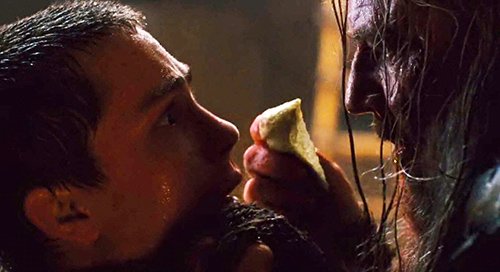
In his last moments, Tubal-Cain gives Ham the snakeskin of the Garden of Eden (he stole it from his father). This signifies that Ham is Tubal-Cain’s successor – not Noah’s.
After surviving the flood, Ham does not reintegrate with Noah’s family. He leaves them behind and makes his own path.
We don’t know if Ham managed to reproduce (probably not). However, we do know that, in the Bible, the story that immediately follows Noah’s Ark is the story of the Tower of Babel – a gigantic tower built by humans to “fight God”. It appears that the Great Flood did not “cleanse” anything and that Tubal-Cain’s lineage survived the Flood after all.
In Conclusion
In the Bible, the story of Noah’s Ark is told in a few simple verses and is filled with enigmatic bits that are never explained (i.e. who were the Giants exactly?). The movie Noah fills in the answers to some of these questions in its own way by augmenting the Biblical tale with fabricated stories and characters, ultimately giving this ancient story a very modern twist. The same way Russell Crowe’s snazzy outfits were tailor-made for a 2014 audience, the messages in Noah were also tailor-made for a 2014 audience.
The movie basically presents two philosophical views: One that is meant for the ignorant masses and one that is meant for “those in the know”. The ignorant masses are told to follow a radical brand of environmentalism that leads to self-hatred: Because humanity is the evil force behind war, suffering and the destruction of nature, it needs to be “cleansed”. This message fits with the occult elite’s depopulation Agenda and is embodied by Noah. At the other end of the spectrum, Tubal-Cain represents humans seeking godhood, acquiring the physical and mental tools to reach the same status as the Creator. This is the Gnostic philosophy adopted by the occult elite. While embodied by the “bad guy”, it is nevertheless presented as an alternative to the absurdity of the Creator who created humanity to then destroy it.
In short, Noah is far from an “idiotic” movie (as some reviewers have stated). It manages to sell a New Age religion based on self-hatred while giving a nod to the occult elite, those who fancy themselves to be descendants of Tubal-Cain. But the occult elite does not believe in radical environmentalism OR care about human life. They are the ones behind all our major wars and their greed is the main cause of nature’s destruction. Through movie’s like Noah, they are trying to put the burden of their own wrongdoings on the unsuspecting masses who usually do as they are told. They want us to welcome the idea of a “great cleansing”.
In the Bible, after the Great Flood, God himself states :
“I establish my covenant with you: Never again will all life be destroyed by the waters of a flood; never again will there be a flood to destroy the earth.”
– Genesis 9:11
So, whether you believe in the Bible or not, know that if there is another major “cleansing” on Earth, it will not come from “the Creator”. It will come from those who have brainwashed you for years, convincing you to believe you are a cancer on Earth.
- Behold a pale horse! – Horses injured four in six-mile rampage after builder 'dropped concrete'
- What?! A Rather Interesting Shein Kids Sponsored Ad on Instagram
- Illinois Public Library and Elementary School to host 'pronoun' seminar for children considering cross-dressing, sex change
- Storyteller Fountain – Birmingham, Alabama
- Patrick O'Carroll- Chlorine in Drinking Water and Refined Salt Causes Cardiovascular Disease
- Another movie about elite sacrifice.
- Pfizer acquired Seagen, a global biotechnology company that "discovers, develops and commercializes transformative cancer medicines".
Get an e-mail notification as soon as a new article is published on The Vigilant Citizen.
-
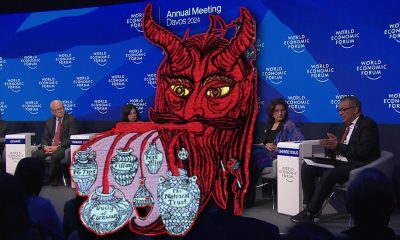
 Latest News3 months ago
Latest News3 months agoThe Top 6 Most Deranged Moments of the WEF’s 2024 Davos Meeting
-

 Vigilant Reports2 months ago
Vigilant Reports2 months agoSuper Bowl 2024 Was a Circus Involving a Clown Wearing an Inverted Cross
-

 Movies and TV3 months ago
Movies and TV3 months ago2024 Grammys: It Had To Be All About Taylor Swift. It Just Had To.
-
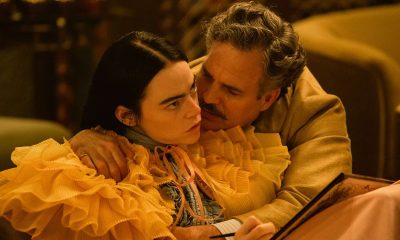
 Movies and TV1 month ago
Movies and TV1 month agoThere’s Something Terribly Wrong With “Poor Things”
-
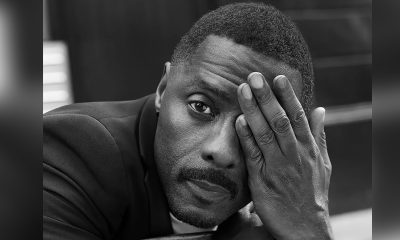
 Pics of the Month2 months ago
Pics of the Month2 months agoSymbolic Pics of the Month 02/24
-
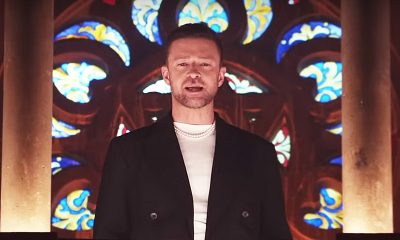
 Music Business1 month ago
Music Business1 month agoThe Blatant Luciferian Symbolism in Justin Timberlake’s “No Angels”
-

 Music Business2 months ago
Music Business2 months agoPoppy’s “V.A.N”: One of the Most Blatant MKULTRA Videos Ever Made
-

 Pics of the Month3 weeks ago
Pics of the Month3 weeks agoSymbolic Pics of the Month 04/24

